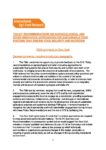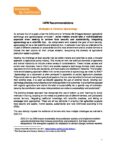
Agroecology
The policy convergence process for the CFS workstream on Agroecology and other innovative approaches started at CFS 46 Plenary Session on 16 October 2019. This session was based on the HLPE Report on “Agroecological and other innovative approaches for Sustainable Agriculture and Food Systems that Enhance Food Security and Nutrition”.
The PSM issued both its Position Paper on Agroecology and its response to the HKLP Report.
In reviewing the HLPE report the PSM endorsed the decisions of the July 2019 FAO Conference to recognise both the five principles of the Common Vision on Sustainable Food and Agriculture as well as the recognition of the co-existence of a broad range of sustainable agricultural approaches that can contribute to meeting the challenges facing farmers and food systems. The understanding that there are a range of sustainable agricultural approaches was highlighted as a priority policy issue that needed fuller elucidation in the recommendations. In addition, the PSM emphasised the need to foster innovations that enhance food security and nutrition through policies, responsible investments, participatory research, knowledge generation and sharing for the achievement of the SDGs.
Subsequently the PSM were invited, together with all other CFS members, to provide views on what the priority issues to be addressed during the CFS policy convergence process were in order to feed an initial zero draft of a CFS policy convergence process.
The process was initiated with the first the open meeting held on 27 January 2020 followed by the Zero Draft CFS Policy Recommendations on “Agroecological and other innovative approaches for sustainable food systems that ensure food security and nutrition”. PSM took part in a series of five informal discussions in May and June 2020 followed by further Open Meetings in February 2021 and negotiations were conducted in March, April, and May.
During the negotiations PSM noted that there are many important interlocking and mutually supporting approaches, techniques and strategies designed to sustainably improve production, enhance resilience, and reduce/sequester GHGs. There is no one size fits all. PSM also noted that there is a concern that framing these strategies and approaches for sustainable food systems from only an ideological or political standpoint and not from the perspective of the farmer provides false dichotomies which can get interpreted as the environment vs. large corporate interests, social issues vs. big business. It therefore gets harder to focus on the tools and management practices that individual farms need to use to sustainably develop their farming operations.
A special session of CFS 48 held on June 4th 2021 endorsed the Policy Recommendations.
-
PSM – Perspectives on Agroecological and Other Innovative Approaches – 2020
Following the series of informal discussions on the issues raised by the zero draft, and Draft One, the PSM members wanted to give the following perspectives.
Download -
PSM – Comments on Zero Draft Agroecology and Other Innovations – 2020
POLICY RECOMMENDATIONS ON AGROECOLOGICAL AND OTHER INNOVATIVE APPROACHES FOR SUSTAINABLE FOOD SYSTEMS THAT ENSURE FOOD SECURITY AND NUTRITION
Download -
Agroecology – IAFN Recommendations
To achieve the UN’s goals under the SDGs and to “enhance the linkages between agricultural technology and agroecological principles” , policy makers should take a multidisciplinary approach when seeking to achieve food security and sustainability, integrating agroecology as a scientific tool. As policymakers work towards the goal of food security, agroecology will be a vital scientific and analytical tool.
Download -
PSM – HLPE Agroecology and Other Innovations – Response by PSM – 2019
The following comments and issues to be addressed during the CFS policy convergence process are provided by PSM and reflect the structure and content of the HLPE Report recommendations which reflect the findings of the report.
Download




